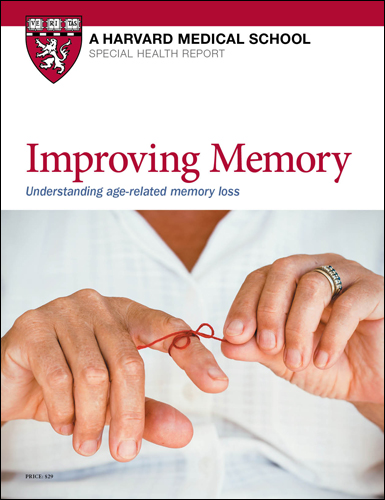Mind & Mood
Common anticholinergic drugs like Benadryl linked to increased dementia risk

A report published in JAMA Internal Medicine several years ago highlighted a link between long-term use of anticholinergic medications like Benadryl and dementia. While this study and other observational studies have also found this association, it doesn't prove that these drugs cause dementia. But we do know that anticholinergic drugs can cause confusion and increase fall risk in older people.
Anticholinergic drugs block the action of acetylcholine. This substance transmits messages in the nervous system. In the brain, acetylcholine is involved in learning and memory. In the rest of the body, it stimulates muscle contractions. Anticholinergic drugs include some antihistamines, tricyclic antidepressants, medications to control overactive bladder, and drugs to relieve the symptoms of Parkinson's disease.
What the study found regarding Benadryl and dementia
A team led by Shelley Gray, a pharmacist at the University of Washington's School of Pharmacy, tracked nearly 3,500 men and women ages 65 and older who took part in Adult Changes in Thought (ACT), a long-term study conducted by the University of Washington and Group Health, a Seattle healthcare system. They used Group Health's pharmacy records to determine all the drugs, both prescription and over-the-counter, that each participant took the 10 years before starting the study. Participants' health was tracked for an average of seven years. During that time, 800 of the volunteers developed dementia. When the researchers examined the use of anticholinergic drugs, they found that people who used these drugs were more likely to have developed dementia as those who didn't use them. Moreover, dementia risk increased along with the cumulative dose. Taking an anticholinergic for the equivalent of three years or more was associated with a 54% higher dementia risk than taking the same dose for three months or less.
The ACT results add to mounting evidence that anticholinergics aren't drugs to take long-term if you want to keep a clear head and keep your head clear into old age. The body's production of acetylcholine diminishes with age, so blocking its effects can deliver a double whammy to older people. It's not surprising that problems with short-term memory, reasoning, and confusion lead the list of side effects of anticholinergic drugs, which also include drowsiness, dry mouth, urine retention, and constipation.
The University of Washington study is the first to include nonprescription drugs. It is also the first to eliminate the possibility that people were taking a tricyclic antidepressant to alleviate early symptoms of undiagnosed dementia; the risk associated with bladder medications was just as high.
This study is another reminder to periodically evaluate all of the drugs you're taking. Look at each one to determine if it's really helping.
Many drugs have a stronger effect on older people than younger people. With age, the kidneys and liver clear drugs more slowly, so drug levels in the blood remain higher for a longer time. People also gain fat and lose muscle mass with age, both of which change the way that drugs are distributed to and broken down in body tissues. In addition, older people tend to take more prescription and over-the-counter medications, each of which has the potential to suppress or enhance the effectiveness of the others.
What should you do about Benadryl and the risks of dementia?
In 2008, Indiana University School of Medicine geriatrician Malaz Boustani developed the anticholinergic cognitive burden scale, which ranks these drugs according to the severity of their effects on the mind. It's a good idea to steer clear of the drugs with high ACB scores, meaning those with scores of 3. There are so many alternatives to these drugs. For example, selective serotonin re-uptake inhibitors (SSRIs) like citalopram (Celexa) or fluoxetine (Prozac) are good alternatives to tricyclic antidepressants. Newer antihistamines such as loratadine (Claritin) can replace diphenhydramine. Exercises to strengthen pelvic floor muscles (Kegel exercises) and cognitive behavioral training can help reduce urinary incontinence.
One of the best ways to make sure you're taking the most effective drugs is to dump all your medications — prescription and nonprescription — into a bag and bring them to your next appointment with your primary care doctor.
Adapted from a Harvard Health Blog post by Beverly Merz
About the Author

Harvard Health Publishing Staff
Disclaimer:
As a service to our readers, Harvard Health Publishing provides access to our library of archived content. Please note the date of last review or update on all articles.
No content on this site, regardless of date, should ever be used as a substitute for direct medical advice from your doctor or other qualified clinician.
















